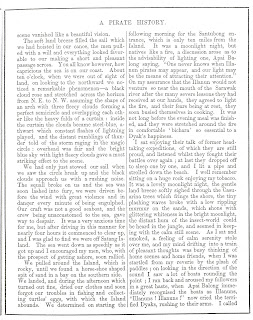
In a post in April I said that by 1829 all the mutineers of the Bounty were dead. Not true. The last died in 1830.
Source: Asiatic journal and monthly register for British India and its dependencies. New series. Oct 1830
by Gavin Pascoe






 Kapa haka perhaps, but under duress. In the story which follows, it becomes apparent that that the advertisement at left calling for religious people to attend backfired on the promoter.
Kapa haka perhaps, but under duress. In the story which follows, it becomes apparent that that the advertisement at left calling for religious people to attend backfired on the promoter. The place referred to Py Lea is Paihia in the Bay of Islands, where a Wesleyan Mission had been set up by Samuel Marsden. On the other side of the bay was the settlement/trading post of Kororareka, which is now known as Russell, and picturesquely known at the time as "Hell". It was famous up to the 1830s as being the most unlawful, drunken, human trafficking, murdering place in the Pacific, and perhaps the world (until San Fransisco got going). It was peopled by beachcombers, runaway convicts and sailors, and Maori traders in kauri, flax, women and preserved heads. Aside from receiving some Maori protection, there was no government or order for Europeans until the late 1830s when the Kororareka Association was set up. This was a loose vigilante type group of grogshop owners, small-time chandlers and traders who meted out their own justice until 1840. Not even missionaries would go there! I'll write more on the Association soon.
The place referred to Py Lea is Paihia in the Bay of Islands, where a Wesleyan Mission had been set up by Samuel Marsden. On the other side of the bay was the settlement/trading post of Kororareka, which is now known as Russell, and picturesquely known at the time as "Hell". It was famous up to the 1830s as being the most unlawful, drunken, human trafficking, murdering place in the Pacific, and perhaps the world (until San Fransisco got going). It was peopled by beachcombers, runaway convicts and sailors, and Maori traders in kauri, flax, women and preserved heads. Aside from receiving some Maori protection, there was no government or order for Europeans until the late 1830s when the Kororareka Association was set up. This was a loose vigilante type group of grogshop owners, small-time chandlers and traders who meted out their own justice until 1840. Not even missionaries would go there! I'll write more on the Association soon.
